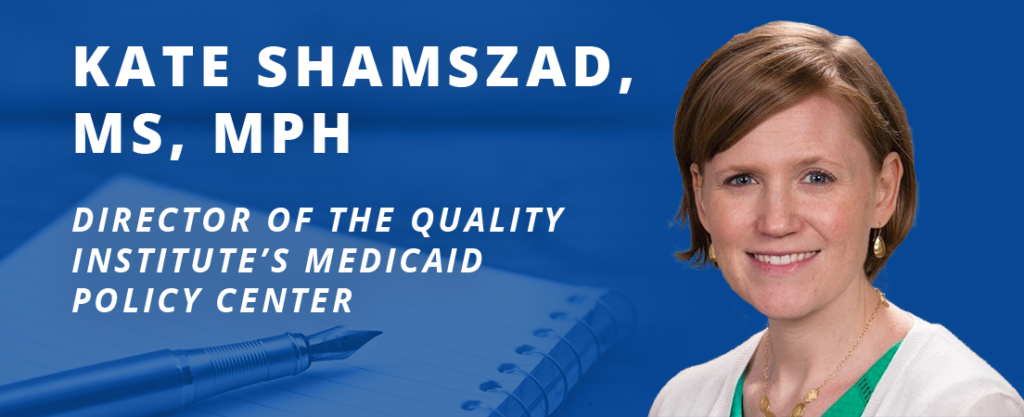Written by Kate Shamszad, MS, MPH, Director of the Quality Institute’s Medicaid Policy Center (MPC)
If we want to improve maternal infant health in New Jersey and address unacceptable racial inequities, we must look to midwifery care as a model and potential solution. As outlined in the report, Delivering Better Care: Midwifery Practice in New Jersey, released this week by the Quality Institute and the Burke Foundation, midwives provide high quality well-woman and perinatal care. They elevate health equity and can significantly impact outcomes for all pregnant people.
Unfortunately, there are not enough midwives in New Jersey and the workforce is predominantly white. The profession is often misunderstood, and more public information is needed to share the unique role and value that midwives provide, especially in providing high quality, patient-centered, respectful care beyond the perinatal period. Midwives provide a full range of primary care and well-woman care from adolescence through adulthood. Less than 10 percent of births in New Jersey currently are attended by midwives, and reimbursement remains an issue for midwives, further limiting access. Midwifery-attended births at freestanding birth centers and in homes are often not covered or are paid significantly less than the cost of the care.
In our report, we focus on four key areas:
- Accessible and diverse education and training pathways
- Equitable care provided within the midwifery scope of practice
- Just compensation and reimbursement structures
- Improved quality outcomes through integration of midwifery care.
And while our report provides a series of recommendations, we know there are many steps to follow. Both the Quality Institute and the Burke Foundation look forward to working together to strengthen the work and advocacy that midwives in New Jersey have been leading for decades.
We created this report through an analysis of available literature, interviews with experts, key stakeholders, and those working in the community and advocacy fields — as well as convening over 40 individuals practicing midwifery, working within the health care system, and supporting maternal care in New Jersey. We also included parents who had received care from midwives in an outpatient setting, in the hospital, and in their home.
Here’s the story from one parent, a physician-in-training, who recently received care from a midwife:
For me and my family, a midwifery birth was absolutely the best decision. Despite being deemed high risk by an obstetrician because of my history of taking blood pressure medication, I have lived an active and healthy life. My midwifery team agreed to give me the assumption of health: They would treat me as if I was a healthy person because I was, and they agreed to continue on that course, through my pregnancy and birth, until there was some reason to not treat me that way. I had two very healthy pregnancies and there were several huge benefits to us for receiving midwifery care.
Access to midwifery care should be available and accessible to everyone in New Jersey, regardless of their insurance or location. Midwifery practice has been a hidden and undervalued profession for too long. In our state, we have the opportunity now to prioritize the midwifery model, build a robust and diverse workforce pipeline, and increase access and payment for midwifery care in the hospital and in the community. Midwifery is an essential and integrated part of the health care continuum.
We invite you to read and share the report, and we welcome you to join us in building upon the advocacy of midwives and their supporters. We must ensure that more people understand the benefits and can easily access midwifery care.

